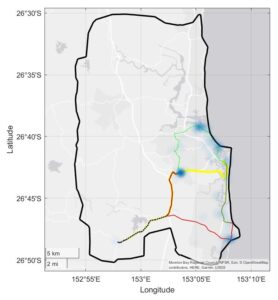Private cars induce most of the transport-related externalities. They produce lots of emissions, make inefficient use of scarce public space, push cities to be more sprawled, and increase social inequity. The opposite of private mobility is sharing a vehicle. Whether it is traditional public transport or emerging on-demand systems, when more passengers share their trips we build more sustainable cities. However, this implies coordinating up to thousands of different users, each of them with their own origins and destinations, and desiring to complete their trips as soon as possible. This theme means studying how to do this efficiently and in a way that does attract users, and is led by Dr. Andrés Fielbaum.
Designing shared systems implies questions in different realms, such as:
- Public transport: How to decide the routes and frequencies of the lines? Which modes to offer? Should some vehicles operate on-demand?
- On-demand ridepooling: How to coordinate thousands of users and vehicles online? What are the overall impacts of a mode that is more sustainable than private cars but less than public transport mass vehicles?
- Users’ behaviour: What are the main problems preventing users to switch to public transport? What new behavioural aspects should be considered when studying on-demand transport?
- Pricing: What are the fairest and most efficient ways to set fares for shared modes? Should subsidies or taxes be implemented?
This video is an example of our research and shows a potential integrated system where large buses follow fixed routes and small vehicles operate on-demand, which could reduce simultaneously users’ and operators’ costs.
And this is an example of a proposed bus network for the Sunshine Coast, based on the flexible routes of on-demand vehicles:

Team
PhD
Amir Elmi, joined March 2024.
- Haoran Zhao, joined March 2024.
- Regine Tejada, joined October 2024.
MPhil
- Ricardo Wang, joined January 2024
Visiting students
- Tristan Lemoalle (ENTP Lyon), April 2024-August 2024
- Jaime Rodríguez (Universidad de O’Higgins), November 2023
Recent publications
- Pellegrini, A., & Fielbaum, A. (2025). Are users ready to accept fully flexible walking in on-demand mobility? Transportation Research Part C: Emerging Technologies, 178, 105210. (Paper)
- Fielbaum, A. (2025). Coordination costs in spatial matching: Assigned versus onsite transport modes. Transportation Research Part A: Policy and Practice, 199, 104556. (Paper)
- Fielbaum, A., Salas, D., Zhang, R., & Castro, F. (2025). Idle wage as a tool to regulate the relationship between ride-hailing platforms and drivers. Transportation Research Part C: Emerging Technologies, 174, 105113. (Paper)
- Fielbaum, A., Tirachini, A., & Alonso-Mora, J. (2024). Improving public transportation via line-based integration of on-demand ridepooling. Transportation Research Part A: Policy and Practice, 104289. (Paper) (Video)
- Fielbaum, A., & Pudane, B. (2024). Are shared automated vehicles good for public- or private-transport-oriented cities (or neither)? Transportation Research Part D: Transport and Environment, 104373. (Paper)
- Fielbaum, A., & Alonso-Mora, J. (2024). Design of mixed fixed-flexible bus public transport networks by tracking the paths of on-demand vehicles. Transportation Research Part C: Emerging Technologies, 104580. (Paper)
- Fielbaum, A. (2024). On the relationship between free public transport, stop spacing, and optimal frequencies. Transportation Research Part B 183, 102924. (Paper) (Presentation)
- Kronmueller, M., Fielbaum, A., & Alonso-Mora, J. (2024). Reducing the Minimal Fleet Size by Delaying Individual Tasks. IEEE Transactions on Intelligent Transportation Systems, doi: 10.1109/TITS.2024.3368101. (Paper)

